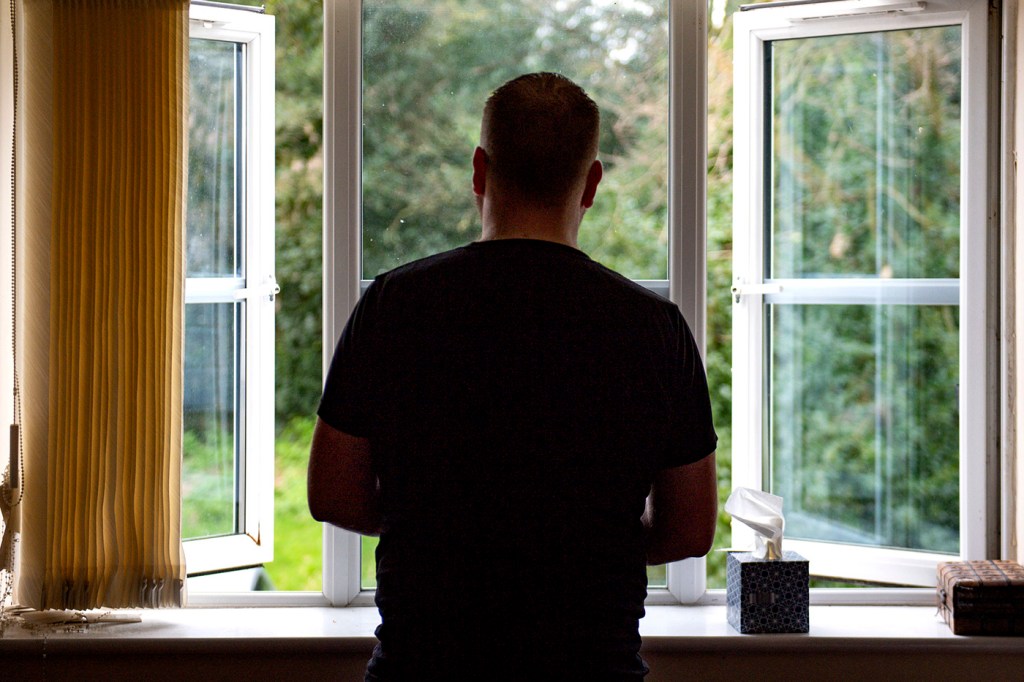Fear can be contagious. Here are some ideas for keeping calm.

A few days ago, I found a note from my upstairs neighbors. Having never talked to them before, I took one look at the hastily scribbled writing and immediately assumed something was very, very wrong. “Oh no,” I thought. “They’ve got COVID-19.” And they’re so sick, I told myself, that all they could do was scribble a last-ditch warning and throw it down the stairs.
But no—they just had plans. The note was an invitation to join them.

Fear of a contagious illness can itself be contagious, says Kristen Lee, a licensed social worker who teaches behavioral science at Northeastern. But there are ways to keep your anxiety in check. Photo Courtesy of Alexandria Mauck
Day in and day out, people are thinking about COVID-19, in part because the fear of something contagious can itself be contagious, says Kristen Lee, associate teaching professor of behavioral sciences.
And since constant stress can not only impede productive action but cause such harm as sleep problems and heart disease, taking measures to stay healthy is important, she says, but so is staying calm.
We know of ways to protect ourselves from and prevent spreading COVID-19—washing hands for 20 seconds, avoiding people who are coughing, and so on—so people who follow these practices and are at low risk of adverse effects from the disease should take solace in their existing habits (with some modifications—lay off the high-fiving). But ignoring the facts, or simply not knowing them, can trigger a fear response.
Fear is part of life, says Lee, who is also a licensed social worker. Anxiety in particular helps us anticipate and prepare for change. But in addition to the physical toll that chronic stress can take, another consequence of excessive fear is simply the inability to think about anything else.
“If we are spending the majority of our cognitive, physical, and psychological resources on worrying,” says Lee, “we are preventing ourselves from devoting them to other activities that can be protective.”
In my case, the fear—that my neighbors were sick—wasn’t necessary. The hypothetical collapsed on itself, and only then did I come to, acknowledging that we all really were doing our best to protect ourselves and others. But that only rendered the distress unnecessary, not unreal.
It’s wise, then, to address all impacts a public health hazard may cause, including stress. If you’re heeding official sanitation recommendations, you’re doing your part. However, if you don’t yet feel the relief of doing so, you might try these approaches (in addition to washing your hands for 20 seconds, of course):
Know when to tune out
“Hype contagion can be provocative,” says Lee, and staying updated on developments is important. “On the flip side,” she says, “the rapid transmission of information can lead us to perceive problems as far worse than they may be.”
In fact, much of the COVID-19-related information you see may not even be true; the World Health Organization officially described this oversaturation of (sometimes inaccurate) content as an “infodemic,” leading people toward inflated numbers and false cures.
For that reason, Lee recommends taking occasional breaks from the news, as well as from social media. And when you return, be sure to turn to credible sources, such as WHO or the Centers for Disease Control and Prevention.
Make (the right) contact
At a time when you could suddenly see your neighbors as nothing more than “bipedal distributors of infectious agents,” it’s hard to feel at ease. But your neighbors may be the antidote to that other infectious agent: panic.
“Exercise, social time, proper sleep, and naming fears with people who are likely to validate, show empathy, and provide comfort without escalating your anxiety can all be tremendously helpful,” says Lee.
Also, she says, remember to laugh.
“Taking breaks to smile, laugh, and engage in fun and leisurely activities can provide a needed boost during trying times.”
Take care of all aspects of your health
Like to chat through problems with a friend? Feel better after you exercise? Don’t give up those activities.
Taking care of yourself amidst a public health crisis includes more than just sanitation, though that’s definitely part of it.
“My spin class bike is probably the cleanest it’s been in years!” says Lee.
Stay present
When the future is uncertain, being “mindful” can also help. “This involves working to stay focused and present in the moment,” says Lee, “without letting the mind wander towards catastrophic scenarios.”
Mindfulness, she says, also fosters objectivity (taking a “non-judgmental stance” on a situation) and helps you become familiar with impermanence; when you’re focusing on the present, all you have is what you’re currently aware of, and that can change at any moment.
Your brain working overtime can’t change other people’s actions, nor can it magically enhance the effectiveness of your own. But prudence and hygiene can improve health, and so can actions that help your head.
My neighbors weren’t sick; they just have bad handwriting (and questionable delivery methods). But even if they were sick, the way safely forward is outlined in official guidelines; the least we can do is follow them, and the most we can do is make sure we’re calm and grounded in the process.
“There are never guarantees of absolute safety—this is an inherent part of living,” says Lee. “Still, we are very adaptable as a species. We are wired for resilience and fortunate to have extraordinary breakthroughs in science and medicine. We have greater awareness of how we can protect ourselves, including our mental health and well-being.”
Northeastern will continue to issue frequent updates about COVID-19 to faculty, staff, and students. For more information, please visit news-northeastern-edu.go-vip.net/coronavirus.
For media inquiries, please contact media@northeastern.edu.





